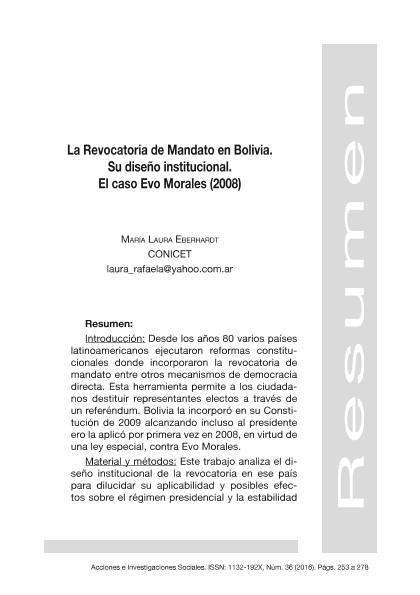Artículo
Introducción: Desde los años 80 varios países latinoamericanos ejecutaron reformas constitucionales donde incorporaron la revocatoria de mandato entre otros mecanismos de democracia directa. Esta herramienta permite a los ciudadanos destituir representantes electos a través de un referéndum. Bolivia la incorporó en su Constitución de 2009 alcanzando incluso al presidente ero la aplicó por primera vez en 2008, en virtud de una ley especial, contra Evo Morales. Material y métodos: Este trabajo analiza el diseño institucional de la revocatoria en ese país para dilucidar su aplicabilidad y posibles efectos sobre el régimen presidencial y la estabilidad democrática. Asimismo, realiza un estudio del caso de aplicación de la revocatoria presidencial contra Evo Morales en 2008. Resultados: El artículo pone de manifiesto el potencial y limitaciones de la revocatoria de mandato en Bolivia como mecanismo de salida institucional frente a crisis de legitimidad de los representantes. Asimismo advierte sobre posibles usos indebidos del mecanismo que pueden provocar inestabilidad de gobierno que pueden provocar inestabilidad de gobierno. Discusión: Finalmente debate el potencial y efectos de la revocatoria para los regímenes democráticos presidenciales de la región. Introduction: Since the 1980s several Latin-American countries have implemented constitutional reforms incorporating the recall, amongst other mechanisms of direct democracy. This tool enables citizens to remove their elected representatives from power by means of a referendum. Bolivia incorporated such a measure in its Constitution of 2009 encompassing even the president and it was implemented by a special law in 2008, against Evo Morales. Material and methods: this study analyses the institutional design recall in Bolivia in order to determine its applicability and potential effects on the presidential regime and democratic stability. At the same time, it also analyses the case of implementing the recall referendum on the presidential mandate of Evo Morales in 2008. Results: the article highlights the potential and shortcomings of recall in Bolivia as a mechanism that provides an institutional solution for crisis of legitimacy faced by its representatives. At the same time it also draws attention to any potential misuse of the mechanism that might destabilise the government. Discussion: finally, it discusses the potential and the effects of the recall referendum for democratically-elected presidential regimes in the region.
La revocatoria de mandato en Bolivia. Su diseño institucional: el caso Evo Morales (2008)
Título:
Recall in Bolivia. Institutional design: the case of Evo Morales (2008)
Fecha de publicación:
12/2016
Editorial:
Universidad de Zaragoza
Revista:
Acciones e Investigaciones Sociales
ISSN:
2340-4507
Idioma:
Español
Tipo de recurso:
Artículo publicado
Clasificación temática:
Resumen
Palabras clave:
REVOCATORIA DE MANDATO
,
CRISIS
,
ESTABILIDAD DEMOCRÁTICA
,
CASO EVO MORALES
Archivos asociados
Licencia
Identificadores
Colecciones
Articulos(SEDE CENTRAL)
Articulos de SEDE CENTRAL
Articulos de SEDE CENTRAL
Citación
Eberhardt, Maria Laura; La revocatoria de mandato en Bolivia. Su diseño institucional: el caso Evo Morales (2008); Universidad de Zaragoza; Acciones e Investigaciones Sociales; 36; 12-2016; 253-278
Compartir
Altmétricas




